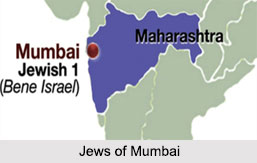 The Jewish community in Bombay consist of three distinct sections: the Bene Israel Jews of Konkan, the Baghdadi Jews of Iraq and the Cochin Jews of Malabar. Due to the economic opportunities that the city provided, the Jews of Mumbai started establishing in the region around the 18th century.
The Jewish community in Bombay consist of three distinct sections: the Bene Israel Jews of Konkan, the Baghdadi Jews of Iraq and the Cochin Jews of Malabar. Due to the economic opportunities that the city provided, the Jews of Mumbai started establishing in the region around the 18th century.
History of Jews of Mumbai
The first Jewish community of Bene Israelis of erstwhile Bombay migrated from the Konkan villages to the south of Bombay. They are believed to be the descendants of the Jews of Israel, who were shipwrecked off the Konkan coast in the year 175 BCE during the reign of the Greek ruler, Antiochus IV Epiphanes. The Bene Israelis of Bombay speak the Marathi language, which is the official language of the state of Maharashtra.
In 1730, the first Baghdadi Jew, Joseph Semah, moved to Bombay from Surat and by the late 1930s, Mumbai had the highest number of Jewish population in India reaching nearly 30,000. Over time, the population of Jews have dwindled and currently there are less than 4,000 Jews living in Mumbai with about 8 synagogues.
Activities of Jews of Mumbai
The Jews of Mumbai have a close tie with the Muslim community of the city. These two groups have been drawn together as minorities in a Hindu dominated land and by the similarities of their non- vegetarian diets of Kosher and Halal foods. The international Jewish organization called the ORT, which is an Organization for educational Resources and technological Training, mandates helping impoverished Jews and sells kosher wine, challah, chicken and baked goods. In 2004, the Hazon Eli Foundation for Jewish Life was set up in Thane, Mumbai and taught Torah, Hebrew and Jewish law to the suburban population of Mumbai.
After the establishment of the state of Israel and India"s Independence, the Jews of Mumbai started to diminish due to immigration.
This article is a stub. You can enrich by adding more information to it. Send your Write Up to content@indianetzone.com.









